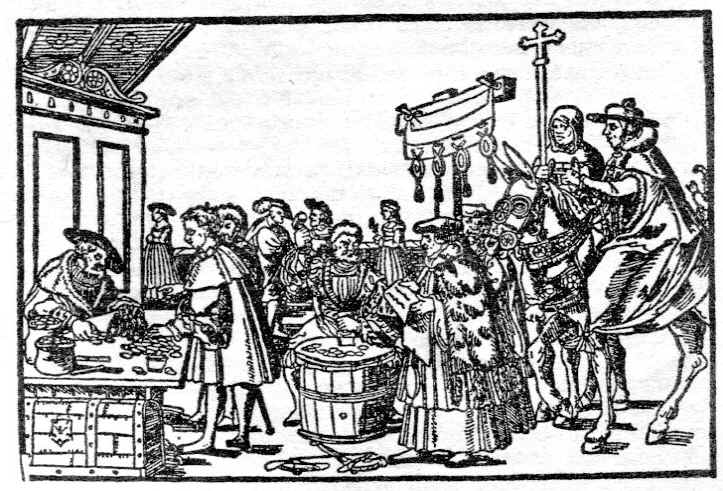

Save me,
St. Anna, and I shall become a monk
Martin Luther.
Who was Martin Luther? Lots of people have been named after him so he must have been important. Because of my catholic education I did not know a lot about Luther except that he was a short fat over-scrupulous excommunicated Benedictine priest who was instrumental in causing a reformation in Europe and then he married a nun and had a bunch of kids. So I began to read about Luther mostly because of all the great people named after him. I was surprised at what I found out, especially the extent to which Martin Luther shaped the modern world as well as modern religion. For example in Roland Bainton's book Here I Stand, which is considered by some the definitive work, an important paragraph can be found on p.301. (highlight mine).
If a German is asked whether a passage of Lutherís Bible
is not remarkable he may answer that this is precisely the way in which any German would speak. But the reason
is simply that every German has been reared on Lutherís version. The
influence of the man on his
people was deepest in the home. In fact the borne was the only sphere of
life which the Reformation profoundly
affected. Economics went the way of capitalism and politics the way
of absolutism. But the home took on that quality
of affectionate and godly patriarchalism which Luther had
set as the pattern in his
own household. The most
profound impact of Luther on his people was In their religion.
His sermons were read to the congregations, his
liturgy was sung, his catechism was rehearsed by the father with
the household, his Bible cheered the fainthearted and consoled the
dying, If no Englishman occupies a similar place in the religious
life of his people, it is
because no Englishman
had anything like Lutherís range. The Bible translation
in
The Luther Bible was so good in fact that it remains the German bible today and probably a much better read than our difficult and archaic King James with all its begots and wences and yees and thous and haths. We finally arrived at a decent translation in the Good News Bible which is so much easier to read but then it's also only 500 years later than Luther's bible.
Another thing about Luther, he was I should say a real smart guy who read and wrote and thought a lot and did not like phonies. The Catholic church at that time, early 1500's was you might consider terribly phoney, especially pope Leo and his ongoing indulgence machine, kind of like printing money. Luther tried to discover religious truth in the scriptures. He came to some pretty amazing conclusions (in blue) with my comments (in black).
1) Redemption comes through faith alone. How often have I heard this but it makes some sense to me I think, not being a theologean. If you do have strong faith then good works naturally follow. Us Catholics are always bellyacheing about the St. Paul thing "faith without works is dead." Well it so happens that Martin was also real big on St. Paul so the point becomes muted.
2) There are only two sacraments. According to scripture that could be correct. If you add tradition you get the Catholic seven but then Luther did not believe that the Fathers of the church were on a par with Scriptures. Fair point.
3) Mass should be in the common Language. Took Catholics a few years (500) to get this one right.
4) Priests can marry. Monks should not. It's better in fact for priests to marry. Catholics are not quite on board with this idea yet. May take another 500 years. I hope not. Luther felt that it was too stressful for a priest to work in the world without a lady companion. Also the temptation was great and he needed someone to cook for him and take care of the kids so he could go about his ministry.
5) Women have bigger butts. They are destined by God for the three K's; church, kitchen, and kids so they need to sit a lot and teach kids, weave clothes, cook, pray in church, etc. I can't believe that Luther got this one sort of wrong. Women need a larger pelvic girdle for childbearing. But he does make some sense.
6) Communion under both species. Check.
Selling Indulgences was a very profitable business back then.

Papal Bull denouncing Luther
